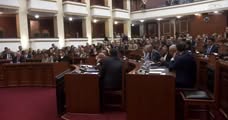
Last year, America ran a budget deficit of 7% of gross domestic product (GDP). That deficit could soon grow even wider. President Donald Trump’s “One Big Beautiful Bill Act,” which would extend tax cuts from 2017 permanently, provide more for hospitality workers and seniors, and increase payments to children in low-income families. The proposed legislation would translate into trillions of dollars in additional borrowing over the next decade. Trump’s theatrical approach to attracting attention is striking, but many other rich countries are also following the same high-spending course. Governments across the developed world are spending more often. This year, France will run a deficit of 6% of GDP; Britain’s will be slightly smaller. The German government will borrow the equivalent of 3% of GDP. Canada’s budget balance is also heading into negative territory. Jean-Baptiste Colbert, a bureaucrat under Louis XIV, defined tax policy as “pulling as many feathers as possible with as little noise as possible.” Today’s governments are not plucking the goose’s feathers but, like the producers of foie gras, stuffing it with force. Governments have always run deficits. France, the land of foie gras, has not had a surplus since 1974. A government can also borrow and reduce its debt at the same time if the economy grows faster than its debt. But what is happening now is unprecedented. Deficit levels would not be unusual if the economy were in recession. The rich world is growing well. Unemployment is near historic lows. Corporate profits are at a healthy level. Meanwhile, borrowing costs have risen sharply. The average interest rate on 10-year government debt is now 3.7% per year, up from just 1% during the Covid-19 pandemic. Under these conditions, economic models would recommend at least reducing the deficit. But today’s governments are choosing to deepen the loss even further. Many are promising to increase defense spending. It may be inevitable, but it is not necessary. In Japan, political parties are touting fiscal stimulus, from cash handouts to VAT cuts, to boost their chances in elections to the upper house of parliament. The British government was forced to backtrack on plans to cut disability benefits and energy bill subsidies for the elderly. South Korea is cutting inheritance tax. Australia is cutting income tax. Even countries that were once cautious are changing course. The German government plans to borrow 800 billion euros for defense and infrastructure investments. Switzerland, too,which had a significant surplus before the pandemic, is now recording a smaller surplus. Next year, it will start paying the “13th month of state pension.” Although the elderly there seem to have no need, that doesn’t matter, because nowadays, everyone gets something.
Why are governments so careless in their spending?
During the pandemic, politicians made a habit of bailing out struggling businesses and families. Then inflation fueled demands for “living crisis” compensation. Today, those in power hope to stop the populists by handing out cash. Whenever a politician proposes spending cuts, the media and social media immediately spread touchy stories, creating pressure not to make changes. Fiscal responsibility has become more unpopular than ever. Until recently, governments could pursue liberal fiscal policies without visible consequences. In 2021–2023, nominal GDP grew at satisfactory levels, inflation was high, and interest rates were low. Under these conditions, rich governments could run large “primary” deficits (before interest payments on debt) and still reduce the debt-to-GDP ratio. Some countries, like Japan, could manage to reduce their debt even with a 12% primary deficit. As a result, two-thirds of the rich world's governments now have less debt than they did five years ago. Japan's debt-to-GDP ratio has fallen by 24 percentage points, Greece's by 68 percentage points. But now, growth is weaker, inflation has slowed, and interest rates have risen. As a result, to reduce debt, rich countries must balance their primary budgets. In Italy, this balance has gone from a deficit of 3.1% of GDP in 2023 to a surplus of 1.3% this year. Italy is reducing its deficit, but not enough. Many other countries are slowing down their debt reduction. Moreover, the trade war increases the risk of an economic slowdown, so public debt in rich countries is expected to rise again. In fact, this is an inopportune moment. Demographers have predicted for decades that the mid-2020s would be the time when the baby boomer generation (those born between 1946 and 1964) would retire, leading to a surge in demand for health care and pensions. Even Britain’s Office for Budget Responsibility (OBR) suggested in 2015 that, even in good times, this would be a time when the government would struggle to stop the accumulation of debt. A demographic crunch and high-spending fiscal policies are set to combine in unpleasant ways. No one can predict exactly when or if markets will run out of patience, forcing interest rates to rise sharply. But there must be a limit to this appetite for debt. As any foie gras lover knows, even the most voracious goose cannot afford to overeat without consequences.
The danger
Demographers have predicted for decades that the mid-2020s would be the time when the baby-boomer generation (those born between 1946 and 1964) would retire, leading to a surge in demand for health care and pensions. A demographic crunch and high-spending fiscal policies are expected to combine in unpleasant ways. No one can predict exactly when or if markets will run out of patience, forcing interest rates to rise sharply. But there must be a limit to this thirst for debt./monitor















